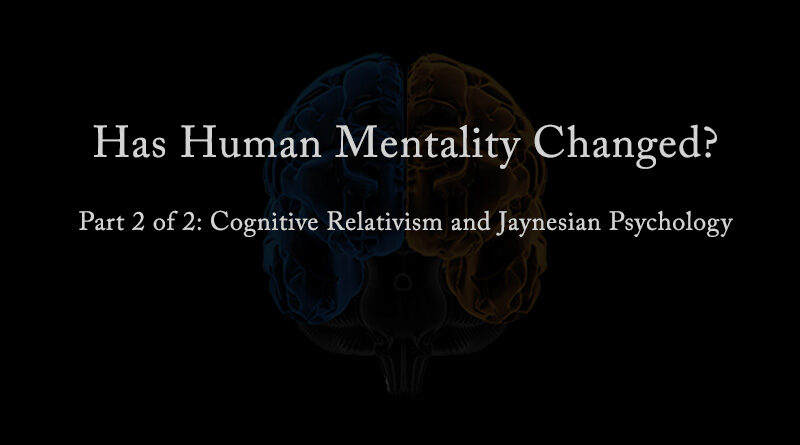Has Human Mentality Changed? Part 2
Cognitive Relativism and Jaynesian Psychology
In Part 1 of “Has Human Mentality Changed?” I discussed how the contributions of Julian Jaynes bolster a radical neuroplastic understanding of the mind, especially if the crucial role of the cultural acquisitions of adaptive cognitive capabilities are incorporated into the analysis of historical changes in psychology, i.e., a neurocultural perspective. Here I want to explore some of the implications of psychic diversity. Three different perspectives illustrate well the significance of psychic plasticity. Though my present discussion is about psychic plasticity as an enculturating (extra-genetic) process, neurophysiological changes cannot be ignored (thus, “neurocultural”).
(1) Psychic Plasticity during the Life Course. Psyche changes over an individual’s lifecycle, from the time an infant is born until a person dies. During a lifetime, new experiences and information alter an individual’s psyche, resulting in an endless series of socializations, desocializations, and resocializations.
(2) Psychic Plasticity across Different Cultures. Different groups, due to socially pragmatic reasons, possess dissimilar ethnopsychologies. These groups may be apparent at the micro-level: families, dyads, small groups, small-scale communities, occupational situations, or at the macro-level (ethnic groups, religious communities, nations, states, etc.). In other words, psychic plasticity assumes there is psychic diversity.
(3) Psychic Plasticity through History. Ignoring history as a source of evidence for psychic diversity and psychic plasticity greatly hinders psychological research. The psychic plasticity of our species is conditioned by history. Certain periods may be characterized by ruptures that produce distinct mentalities functionally adapted to the vagaries of passing time, and different historical periods are characterized by radically different ethnopsychologies. The cultural–historical approach profoundly resonates with Jaynes’s agenda. This has huge implications, since it demonstrates that the human condition and its psychological apparatus are not ahistorical constants. Instead, people are “naturally adapted to change and constitutionally equipped with organs which enable them to learn constantly, people are naturally adapted to change and constitutionally equipped with organs which enable them to learn constantly, to store up new experiences all the time, to adjust their behaviour correspondingly, and to change the pattern of their social life together” (N. Elias, What Is Sociology? 1978, p. 115). What we call human nature, then, is fundamentally and radically malleable. “It should not at all be understood as an all-inclusive immutable state which always remains the same. As such, there is no bench-mark of some universal human condition” (K. Tester, Civil Society, 1992 p. 86).
Psychology: Capital “P” versus Small “p”
Adopting and seriously pursuing a psychic diversity research agenda presents a number of significant theoretical implications. First, it forces us to reconceptualize the relation between society and mind. In other words, psyches differ so much by period and place because of all the varied “social stuff” that constitute mentalities. Being “in society” demands that we recognize the limitations of “Psychology” (single and with a capital “P”). We should be concerned with “psychologies” (plural and with a small “p”), which are products of particular social environments and producers of repertoires of useful tools and tactics used to navigate through the everyday world. Any society (or for that matter, any individual) is equipped with an array of different cognitive strategies which are historically and socially contingent. Recognizing the importance of psychologies allows us to incorporate what are usually regarded as non-psychological (social, political, and economic forces) into understandings of psyche as a sociohistorical formation. Psychologies position the concrete and local (rather than the transcendent and universal) in the foreground of analysis, and teach us that the most interesting aspects of psyche are historically constructed, not neurologically given.
Also various forms of sociopsychological behavior — which for the most part are ignored by conventional psychology — strongly evidence that assumptions about human mentality are woefully inadequate. Consider trance, hypnosis, “spirit possession,” channeling, imaginary playmates, and nonpathological hallucinations among “voice hearers.” While looking for the common denominators that unite humanity is important, taking human diversity seriously is crucial. We need to escape from the intellectual straitjacket that while we are encouraged to speak of cultural diversity and cultural relativism, investigations of cognitive diversity and cognitive relativism are taboo. The assumptions of cognitive homogeneity and cognitive sameness may seem safe, but they hinder explorations of the myriad ways of being human, both past and present. The recognition and depiction of psychic diversity allow us to avoid the aridity and platitudes of a nondescript “common humanity.”
Learn more about Julian Jaynes’s theory by joining the Julian Jaynes Society and reading our books.


